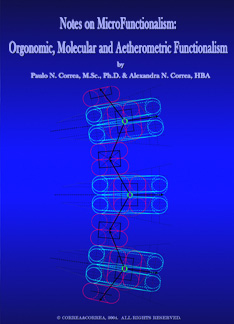![Akronos logo]](/images/akronos_wheel.jpg)
|
Akronos Publishing Concord, ON, Canada www.aetherometry.com |
![Akronos logo]](/images/akronos_wheel.jpg)
|
Akronos Publishing Concord, ON, Canada www.aetherometry.com |

Notes on MicroFunctionalism: Orgonomic, Molecular and Aetherometric Functionalism
by Correa, Paulo N. & Correa, Alexandra N.
Published in January 2008. 10 pages.
Philosophy of Science & the Politics of Thought
Monograph AS1-08
VIEW FULL TEXT: HTML
|
ABSTRACT
Functionalism is, in general, taken to mean the principle that form or structure (conceptual, aesthetic, scientific, etc) follow, or should follow, function. A major part of the problem of functionalism resides in the determination of what is meant by function or functions. As we shall see, the functions acknowledged by molar functionalist theories are solely 'statistical' or 'molar functions' which are, after all, always exercises in Power. The remainder of the problem resides in the fact that only machines capable of forming themselves while functioning can create functional structures, ie forms that are one with their functions - which is the only sense in which structure can 'follow' function. But then, such machines only operate with microfunctions, not statistical or molar functions. There are, accordingly, two distinct types of functionalist theories - those (microfunctionalist) that work because they tend to uncover microfunctions, and those ('molar functionalist') that are false because the functions they pursue are merely statistical or molar operations. Orgonomic functionalism, molecular functionalism and aetherometric functionalism are all forms of microfunctionalism to the extent that they pursue the singular energy transformations of nature and, in particular, the self-regulating properties of living systems. From a microfunctionalist perspective, to function is to follow the flow of energy and a function is a creation, a principle of continuous creation - at once a connection productive of difference, an analytical disjunction and a new synthesis, a singular conjunction (a functional identity). Microfunctionalism is 'the elastic form of thought' (Reich) that pursues energy functions. |